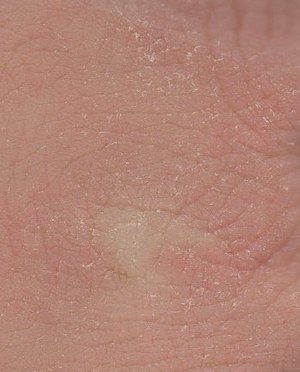| Severe dry skin in the winter (Photo credit: Wikipedia) |
Moisturize with essential oils. Prepare your bath soak in the tub the usual way, making sure the water is hot enough to open your skin pores, but not so scalding hot that it burns you. instead of adding bath salts, add a tablespoon or two of any kind of natural oil, such as olive, almond, jojoba, hazelnut, or Moroccan Argan oil. Stir the oil into the water until it's blended thoroughly.
Submerge your whole body in the tub and soak your skin in the oil-treated water for approximately five minutes. This is enough time to let your skin cells absorb the oil's moisturizing and nourishing properties. After the bath, you'll feel your skin has become softer and smoother when touched. If the bath wasn't enough to rehydrate your skin, then apply a few drops of oil onto your whole body and rub it into your skin until it's been absorbed.
Avoid food and beverages that cause your body to lose water. Examples of these are liquor and caffeinated drinks, such as coffee, tea, and soda. They're considered diuretics, which stimulate your body to urinate more frequently than usual. However, many people love to drink these beverages and if you're one of them, then increase your intake of water. Drink eight glasses or more each day to keep your body and skin well hydrated. Drink more water when you exercise or do rigorous activities, such as dancing or hiking.
Protect your skin from harsh elements. Be careful of the sun's UV rays, which can harm your skin. Aside from causing mild sunburn, the UV light also increases your risk in developing cancer. Wear the right thickness of clothing during autumn and winter when the wind and cold can chaff your skin. Let your skin breathe during summer and spring by wearing light-to-medium thick clothes.
Humidify your skin. Use a hydrosol spray that spritzes water onto your skin when it's very hot and the air is too dry. Add a few drops of lavender, German chamomile, and rose essences to invigorate your skin cells. Use humidifiers when you're staying in an air-conditioned room for long periods.


Comments
Post a Comment
Tell me what you think.